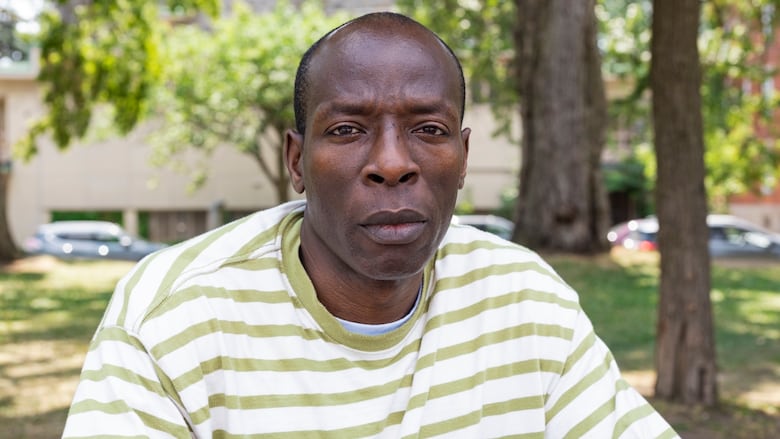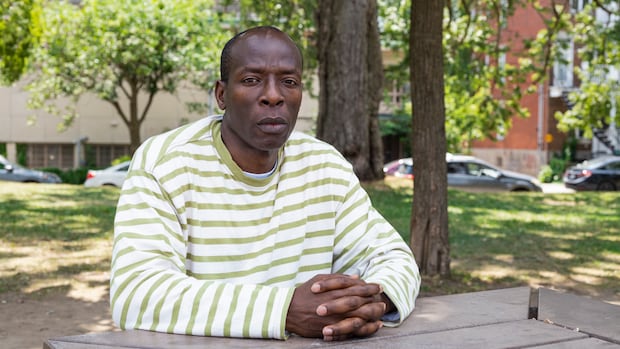Terrebonne, Que., police officers suspended for racial profiling
'A white man would not have received the same treatment,' judge says

Quebec's police ethics administrative tribunal has ordered the suspension of two officers for racially profiling a Black man in 2019 while he was driving in Terrebonne, Que., north of Montreal.
The decisions published on June 23 and July 16 are rare instances in which the Tribunal administratif de déontologie policière imposed sanctions on an officer following a complaint.
Justice Benoit McMahon ordered a 14-day suspension without pay of officers Vincent-Anthony Cléroux-Mastracchio and Charles Ballard for "committing actions based on the race and colour of" Pierre Marcel Monsanto.
In 2023, Monsanto filed 15 complaints against Terrebonne police for stopping him without valid reason between 2018 and 2021 and issuing him more than $6,000 in fines. Fourteen of those stops were made within 11 months. Quebec's Human Rights and Youth Rights Commission is seeking $205,000 in damages on Monsanto's behalf.
In addition to being suspended, Cléroux-Mastracchio has been ordered to successfully complete 19 hours of training about racial profiling, offered by the École nationale de police de Québec, while Ballard was ordered to complete eight hours.
"The tribunal concluded that Mr. Monsanto's race or colour had influenced officer Cléroux-Mastracchio's decision to intervene, after analyzing the circumstances of the interception, and that a white man would not have received the same treatment," McMahon's July 16 decision reads.
McMahon says "sanctions are not imposed for the purpose of punishment" or only to protect the public; they are meant to discourage police officers from repeating offences and "serve as an example for other police officers who might be tempted to commit similar acts."
Monsanto, who still lives in Terrebonne, said in an interview on Monday that while he is pleased by the decisions, he is "always on alert."
"Considering everything that's happened, my name is probably on a blacklist," he said. "I don't know… I always think there might be some kind of retaliation."
He says that once his situation allows it, he won't hesitate to leave Terrebonne.

Fo Niemi, executive director of the Center for Research-Action on Race Relations (CRARR), who has been supporting Monsanto with his cases, says the two decisions are "very significant," particularly because they involve a municipality outside the island of Montreal.
"The tribunal uses in these decisions very strong language to condemn racial profiling and to say how much not only is it an assault on Black citizens' and Black drivers' rights, but also how racial profiling undermines police credibility and the trust between the police and the community," Niemi said.
Racial profiling often happens 'unconsciously,' judge says
Monsanto filmed the interventions of Ballard and Cléroux-Mastracchio when they each stopped him while he was driving a car registered under his spouse's name.
Neither of the officers fined him during the interventions.
Ballard intercepted Monsanto in March 2019 after their vehicles were facing each other at a red light in Terrebonne, according to the decision. Since the vehicles were heading in opposite directions, Ballard made a U-turn and turned on his sirens to reach Monsanto.
Ballard told Monsanto that he intervened because the driver's car was registered under a woman's name, the decision says. When Monsanto provided his driver's licence and relevant documents, the officer accompanying Ballard found that everything was in order.
"The tribunal concluded that the U-turn made by officer Ballard to catch up with Mr. Monsanto and the inconsistency between the reasons he gave at the hearing to justify the driver's stop and the actions he took during his intervention constituted evidence of racial profiling in this case," the June 23 decision says.
In July 2019, Cléroux-Mastracchio stopped Monsanto at an intersection that police were increasingly monitoring due to drivers not making a mandatory stop. It is located less than a kilometre from Monsanto's home.
After Monsanto stopped and turned the corner, Cléroux-Mastracchio saw the driver's car approach him, the decision says. The officer learned that three driver's licences were linked to the same address, including that of the vehicle's owner. One of the licences belonged to another man and had been cancelled.
The ruling says Cléroux-Mastracchio stopped Monsanto and asked to see his licence and registration documents. After Monsanto provided them, the officer told him to lower his window. Because Monsanto didn't react, Cléroux-Mastracchio asked him to confirm his address and his connection to the vehicle — questions the driver ignored, according to the decision.
Cléroux-Mastracchio conducted more checks before he released Monsanto and told him that greater co-operation would be "appreciated" if he is intercepted again, the decision reads.
"The phenomenon of racial profiling is complex and often occurs unconsciously," the July 16 ruling says. "It involves the discretion of police officers during so-called random stops, a combination that often leads to racial profiling."
An unnamed spokesperson for Terrebonne police said in an email that the police service would not comment on the tribunal's decision until the judicial process is completed.
